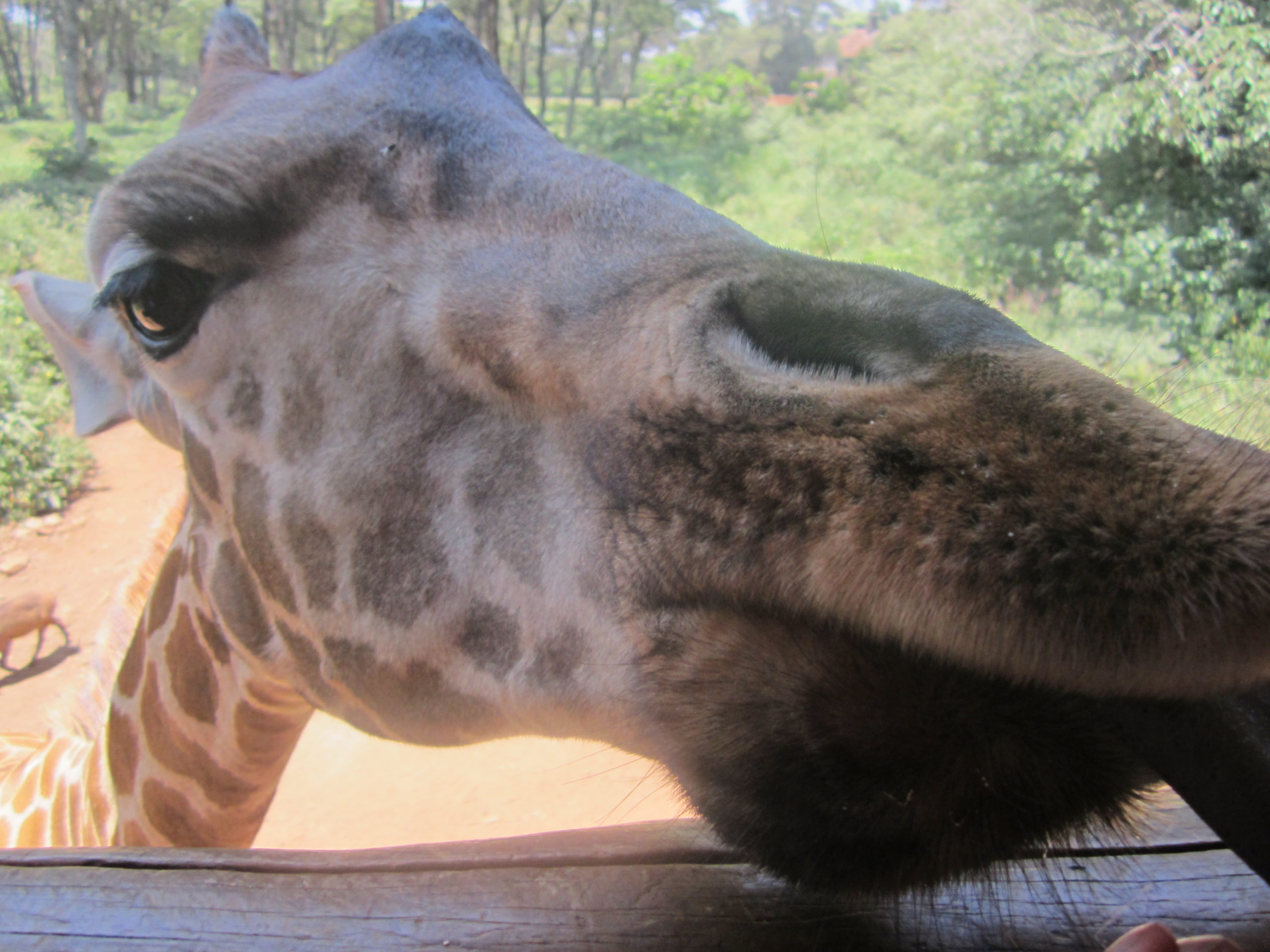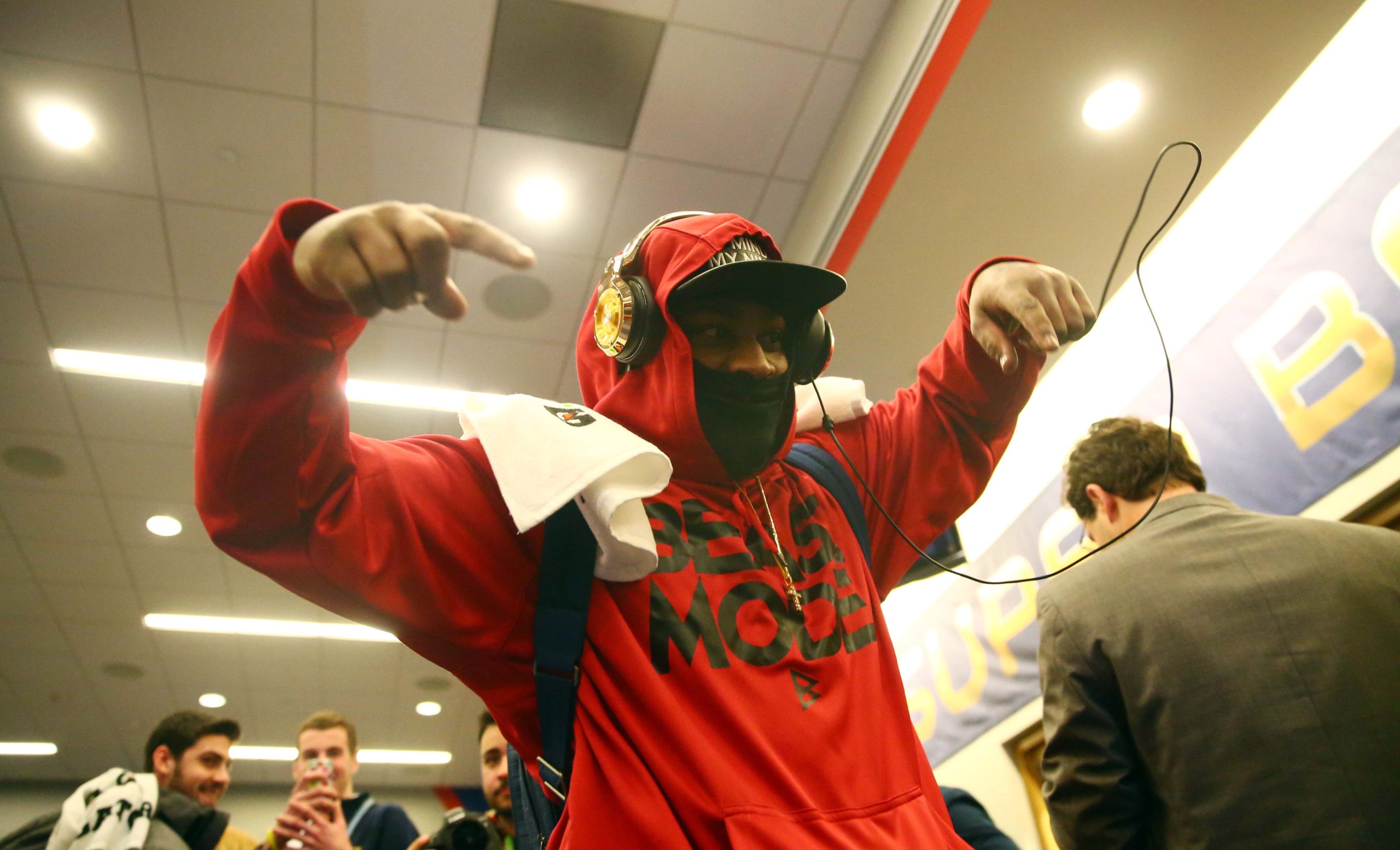The Seattle Seahawks played nineteen games this season, and I watched all of them — all of them, except one. As the Seahawks took the field at MetLife Stadium to do battle with the Denver Broncos in Super Bowl XLVIII, I was fast asleep in the Kenyan bush, 100 miles west of Nairobi. It was 2:30 in the morning. When I emerged from my tent at dawn the game was long over. I dreamed that the Seahawks had beaten the Broncos, 16-14.
Team Kenya Safari consisted of my brother Andrew, Mom, Mom’s friend Betsy, and Mom’s sister Margaret, and myself. Safari! Wooo!!! The morning after the Super Bowl, we went on a hike to visit a primary school and learn about the trees that heal gonorrhea (‘gon-OR-rhe-a’ in Kenyan parlance). Jonathan, a Maasai warrior, was our guide. We had visited his village the day before. I asked him if his village played any sports for fun. “No,” he said, “but I ran relays in college.”
We would next have Wi-Fi in four days’ time, at the Lake Nakuru hotel. We could stream the Super Bowl there. By some T-Mobile voodoo magic, Margaret’s husband was able to deliver her the final score. She told Betsy, and they were on strict orders not to discuss the game until the rest of us had watched it ourselves.
We mingled with lions, zebras, and elephants on the Serengeti, paid visits to villages, farms, and schools, and made escapes from hordes of rabid whittled-giraffe salesmen. At last, we made it to the Lake Nakuru hotel. Andrew, Mom, and I sat outside at a picnic table overlooking the lake, sipping Tusker (the local brew of choice) and downloading the NFL Game Rewind app on Mom’s iPad so we could watch the game. The app loaded at a glacial pace, but our spirits soared high above the Kenyan savanna. The wait was finally over. Seahawks! Broncos! The big enchilada! Let the rumble begin!!!
I tapped Begin Stream. A message popped up. It read: “Sorry, NFL Game Rewind has not been cleared for use in your region.”
What happened immediately next was a blur. Profanities were uttered. Tusker was consumed. “Isn’t the NFL supposed to be trying to expand into foreign markets?” Andrew asked.
Marooned by the National Football League. Classic. In retrospect, I should have seen it coming. But if I had endured the four-day wait with anything less than 100% hope for a successful viewing, I would have folded and asked Margaret the score. It was a valiant effort, and for that I patted myself on the back. Now there was little choice but to rip off the band-aid. Mom checked the score and announced the result: the Seahawks won. 43-8.
It was the first Seattle championship of my lifetime and instantly the greatest moment in Seattle sports history. As such, I got up and humped the air triumphantly, but I could already tell something was wrong. There was no euphoric rush, no pleasant tingle, not even the kind that comes from swishing a three-pointer. There was nothing to savor. I hadn’t earned the emotional reward of victory. I hadn’t hiked to the mountaintop, I flew there by helicopter. I had cheated. Or rather, I had been cheated. I would be better off in Jonathan’s village, I thought, having never heard of the Seattle Seahawks, never grasping the concept of sports because sports only exist on the upper rungs of Maslow’s hierarchy of needs.
I self-diagnosed myself with acute retroactive FOMO. It can be more or less summed up in terms of my friend Larson Gunnarsson. Heart of gold, lover of dogs, he was that kid in 3rd grade who licked slugs and cried when his team lost in football at recess. He is the truest sports fan I know. He flew out from Seattle to New York, where I live, to attend the Super Bowl with his brother. After the game, he posted on Facebook: “Tonight is the single best day of my life and nothing has ever come close. SEAHAWKS!!!!!!!”
I know exactly what sort of afterparty went down, because I’ve constructed it in my imagination. Immersed in a giant army of Seahawks fans, Larson, our friends, and I take to the streets of Manhattan full of Jim Beam and jubilation, first the East Village, then Downtown, then up to Midtown, then to Central Park as the sun rises to share what remains in our flasks with the homeless, and finally to the Upper West Side for Monday brunch.
***
Stranded in a distant land. A victim of injustice. I couldn’t even relate my plight to my own brother, a diehard Mariners fan but only a casual Seahawks fan. For the first time, I found myself craving the 12th Man.
Over the course of the 2013 season, I grew increasingly cynical about the Seahawks’ famously loud home crowd, the 12th Man. As the Seahawks’ record progressed from 4-0 to 8-1 to 12-2, the national media paid the 12th Man progressively more attention and fair-weathers piled onto the bandwagon. I rolled my eyes as the 12th Man attempted to coronate itself with the Guinness record for world’s loudest crowd. I rolled my eyes as people posted pictures of their freshly needled ‘12’ tattoos, as one young couple named their newborn Cydnee Leigh 12th Mann. What a bunch of tools, I thought. I didn’t need the 12th Man as a prop to prove my devotion to the Seahawks. If there is a God, he knows I’m a real fan.
A couple days before the Super Bowl, at the elephant orphanage in Nairobi National Park, we spotted a woman taking pictures with a 12th Man flag, and Mom chatted her up. Margaret, a Denverite, sidled up alongside the woman and nudged her in the ribs. “Go Broncos,” she said.
The woman nudged Margaret back. “Go Hawks,” she said.
This jocular ribbing amongst women in their late fifties continued for about ten minutes, after which Andrew and I were coerced into posing for a picture with the 12th Man flag. To my horror, Mom later posted the picture to Facebook.
Mom isn’t much of a football fan. But if we had been able to stream the Super Bowl at the Lake Nakuru hotel, I would have watched in relative silence while she screamed obscenities and made herky-jerky guttural noises at the screen. The line between the fair-weather and the diehard blurs in the moment of reckoning.
Mom is a lot like Ramsey from the Bud Light “It’s only weird if it doesn’t work” commercial in which the narrator, who we’ll call Steve, is forced to watch the Patriots game with the overzealous Ramsey. I hate watching football with Ramsey. All he does is yell. They can’t hear you, Ramsey! But the Patriots never lose when Ramsey comes over to watch. I love you, Ramsey, Steve says.
Who is crazier, Ramsey or Steve? Ramsey becomes so engrossed in the drama of the game that he loses contact with reality and forgets he’s with people. Ramsey is Alan from “The Hangover” gone berserk. Steve keeps his composure, but he’s convinced himself that Ramsey, if sitting in Steve’s living room, possesses the ability to bend cosmic vibrations such that they align in the Patriots’ favor. Within every fan there is both Ramsey and Steve, both the passion and the superstition that sustain the belief that fans are as integral to the sport as the players. If players are artists and no one recognizes their work, did they create anything to begin with? Arrogant and selfless, fans want above all to compel their players to dig deeper, until they become more than just an audience – until they become actors.
The 12th Man isn’t an expression of tradition. It’s an expression of this belief that fans matter. The central precept of the 12th Man is to be heard, the goal to disrupt the opposing offense’s play calls and snap counts. Since 2012, the Seahawks are 10-8 on the road and 17-1 at home. The cause is worthy. The cause is virtuous. As the 2013 season progressed and the stakes rose, the cause broiled itself into a tsunami that breached the walls of CenturyLink Field and swept across greater Seattle. Fair-weathers everywhere, their capacity to emote no less than that of the diehards. My dad reported that during his trip to the grocery store the day before the Super Bowl, “every woman from age 5 to 85 was wearing a Seahawks jersey.”
The 12th Man isn’t an expression of tradition. It’s an expression of a civic pride Seattle never before knew it had.
The morning after the failed attempt to watch the Super Bowl, we went on a game drive in Lake Nakuru National Park. As the rest of Team Kenya Safari clutched their binoculars and scanned the horizon for rhinos, I laid despondent and wistful in the backseat, my mind elsewhere. I wasn’t thinking about the highlights I’d ended up watching on repeat the night before, or the Seahawk players who had fulfilled their lifelong dream of winning a Super Bowl. I thought about Larson Gunnarsson and company going buckwild in New York. I thought about the 700,000 Seattleites who turned out for the victory parade.
When a team wins a championship, how much ownership can fans claim? They exist on the same emotional plane as the players. But unlike fans, players both participate in and bear witness to greatness. The role of the fans is ambiguous and peripheral, no matter how intense their fervor. If fans lay dubious claim to the real trophy, they at least can claim a parallel simulacrum of a trophy and pass it around amongst themselves. A fan isn’t on a journey with the players – he’s on a journey with other fans. The players aren’t his brothers — the fans are.
Watching the Seahawks has been a reliable source of emotional and existential purpose for me over the years. If my reaction to them winning the Super Bowl by a score of 43-8 is any indication, sharing the viewing experience with others, however remotely, must be meaningful. When I watch a Seahawks game alone in my New York apartment, I am not Bear Grylls, self-sufficient in a wilderness of degenerate Patriots, Giants, and Jets fans. I am occupying the same psychic space as other Seahawk fans watching the game same as me. If Andrew, Mom, and I had been able to watch Super Bowl XLVIII, it’s not as if we would have been the only three Seahawk fans on Earth. Through time and space we would have rode with the 12th Man.


